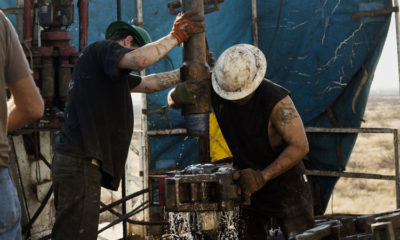Finance
Naira Devaluation Will Restore Economy — Ajaegbu
Published
9 years agoon

Chidi Ajaegbu, the Chief Executive Officer, Heritage Capital Markets Limited, and the immediate past President, Institute of Chartered Accountants of Nigeria, speaks with OLAWUNMI OJO of Punch News on how government could reverse the dwindling fortunes of the capital market
The Nigerian capital market is said to be second only to that of South Africa. But the market is crumbling. What is responsible for this and how can the trend be reversed?
In an economy, there are a lot of variables that drive the valuations in the capital market or the asset pricing in other sectors. The market does not work in isolation of the economic policies of government; it takes a cue from how policies of the government impacts on people’s standard of living.
Looking at the last 12 months, especially in the last quarter and considering the seamless transition of power between the incumbent and the immediate past administrations, we felt the market would build on that to sustain a rally. Unfortunately, the decline in the crude oil price and the obvious challenges the economy has had over a period of time created a lot of issues in terms of valuation of the naira.
The very adamant posture of the government does not apply to economics. Economics does not obey order. We must recognise that for us to attract foreign investors, we have to devalue. There are no two ways about it; we do not have the resources to fund the naira at the level it is today. We have to tell President Muhammadu Buhari without equivocation that it is not an ego thing but something necessary that must be done to attract foreigh investors.
Foreign investors in the market are in a hurry to exit, which has led to a lot of glut. And when there is excessive supply, it impacts on the price. Price begins to go south. So, the inability of the market to sustain any rally is because the foreign investors who constitute about 70 per cent of the market are no longer participating in it from the demand side. They are dumping stocks and trying to get away as quickly as possible, probably so as not to be caught with the issue of devaluation. Once that happens, no matter what your returns are in the market, you are going to take a direct hit of whatever percentage devaluation government comes up with.
We also need to deal with the perception issue. For instance, the reputation risk the government is going through with the very punitive MTN fine has far-reaching implications. Nobody is saying MTN should not obey the laws. But the company probably employs over a 100,000 people. And if it has committed an infraction, yes it should be sanctioned. But how do you ask a company to pay a fine equivalent to its 15 years profit after tax. You want to liquidate the company? As a foreign investor, would I want to come into the country under this kind of hostile environment? Even when you imprison people, it is a correctional thing; it is not meant to be terminal. There is need for consistency in our policy positions.
What I have seen is that we are fighting corruption on the one the hand but the rule of law that should drive the culture of excellence and atract investors is being trampled upon. If a court of competent jurisdiction grants somebody a bail, it is wrong for government to generally disregard such decisions. As such, you send negative signals to investors that you decide what court order to obey and which not to obey.
Aside from this, I think the anti-corruption crusade is being given more bite and it is good for us. But to take the capital market out of the bearish cycle where it is now, we need to first devalue our currency and then institute a rule of law that is functional.
The President says he is not convinced on the need for devaluation, especially by his economic team? Are they not seeing things from your perspective?
They are political appointees and there is a limit to how far they can drive a contrary position to the President’s. Even a non-finance or economics student will know that devaluation is the thing to do.
In any case, we would not have a choice; it is not about convincing the President. We would devalue this year. The President would be forced to devalue. What he probably does not understand is that the more aversed he is to devaluation, the more the economy will suffer. We do not have resources to fund the naira at the level we are funding it. The world knows that; if the President does not, it is unfortunate. The President’s grasp of economic issues is limited because of his background but that is why he has economic advisers and ministers. He has to listen them; he must have an open mind.
Some experts have opined that even if Nigeria devalues, it would in no way add to its reserves. What, in your view, would be the advantages of devaluation?
You would be paying probably less for a lot of imported goods. You would attract foreign investors as they return with money that would give them more naira. The multiplier effects could actually reflate and drive the economy to where it should be.
What do we stand to gain by remaining where we are now and doing nothing about it? I am not calling for a total devaluation. But by now, the economic team should be giving us scenarios that if we devalue by certain percentages – 25, 50 or 75, so and so would be the policy implications. They should simulate those scenarios for the President to have options to choose from. And then, they should also let him know that if we do not devalue, so and so are the implications. The President could then study the opinions, call for independent third party opinions from one or two economists he respects, and compare the opinions. But that he is not convinced? That should not be the attitude.
Is there anything stakeholders and the Nigerian Stock Exchange can do to change the fortunes of the capital market?
It is totally out of their control. They have done all they can – giving zero-tolerance to market infraction, with which they have built confidence.
That is not enough to drive a bullish rally in the market and sustain it. It is a free market – free entry, free exit; you can not stop people from selling their stocks if they want to, except you want to close down temporarily like they do in the far-east. But you cannot suggest that here. As a matter of fact, when you do that, you are sending wrong signals. In China, Hong Kong and all of those places, what they do is that their government intervenes by mopping up excess supplies in the market. Government would buy it up to stabilise the market.
As we speak, the capital market has lost over 20 per cent this year alone in terms of total capitalisation, yet there is no government intervention or pronouncement. Meanwhile, the capital market is the single most important indicator of how your economy is doing. It determines a lot of things. So, ministers should be very sensitive and proactive in what is happening in the market. For government not to be saying anything when the market is almost collapsing totally shows the level of appreciation of the market in government circle.
But do you see the market rebounding anytime soon, perhaps this year?
Not immediately. Perhaps, towards the end of the year. But that again would depend on if the crude oil price picks up and we begin to see that Nigeria can effectively sustain and fund the foreign exchange element of our economy. May be that could attract foreign investors. Without investors coming back, the market cannot rebound.
We also anticipate that earnings this year would be impacted on – banks, oil companies and virtually all the sectors. We would start seeing the result. There is no way major banks and oil companies would not take hits because the decline in growth of the GDP would reflect in their performance.
Government has been fixing the foreign exchange rate. But some experts opine that it should be determined by free market forces. What’s your view on this?
No, that would be too dangerous for Nigeria because we are not producing anything. Government is right by fixing it but they need to be more flexible, not too rigid. Nigeria cannot allow her currency to float. Even China, with over $2 trillion in reserves, cannot. You would open your economy and currency to attacks by set economy or individuals. Look at Russia spending 40 per cent of their reserves to defend their currency, it was not necessary. Yet, they lost massively.
Foreign investors are said to dominate the market at a ratio of 70 to 30 per cent of indigenous investors. How can the nation improve local participation?
Indigenous investors lost confidence after the crisis of 2008/09, many of them lost a lot of money. The foreign investors are far more discerning than the locals, that is why they are still in the market.
However, what the Exchange has done since then is to try and rebuild confidence of local investors in the market by introducing zero-tolerance for infractions, transparency in transactions and all of that. But even at that, it has taken our people longer time to get over the losses they incurred. Until you are able to deal with that psychological thing, you cannot have them come back the way they came pre-2008.
On the whole, government must devalue the currency, change their posture and be more flexible with policy positions, while the Central Bank of Nigeria needs to work on a lot of things.
People are being careful now because of the renewed anti-crime crusade but I think government is wasting too much time on it. We hear there are recoveries but we have not seen facts and figures; government should be more open on how much is being returned and how the funds are being applied. You may not necessarily disclose names but let us know how much is being recovered.
Is the CEO and Founder of Investors King Limited. He is a seasoned foreign exchange research analyst and a published author on Yahoo Finance, Business Insider, Nasdaq, Entrepreneur.com, Investorplace, and other prominent platforms. With over two decades of experience in global financial markets, Olukoya is well-recognized in the industry.

You may like
-
Nigeria Joins BRICS as Partner Country, Strengthening Global South Cooperation
-
70 Million Poorest of The Poor Nigerians To Get N75,000 From FG
-
Nigeria Surpasses OPEC Quota with 1.51 Million bpd, Targets 2.06 Million in 2025
-
Global Investors Commit $7.6 Billion to Nigeria’s Development at AIF 2024
-
Nigeria-China Trade Strengthened as Grimaldi Introduces Direct Shipping Line
-
Nigeria’s GDP Records 3.46% Growth in Q3 Spurred by Non-Oil Sector













